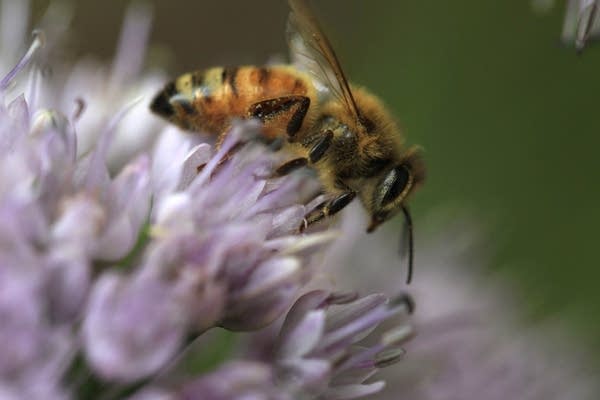Bee research lab gets buzzing at U

The University of Minnesota broke ground Monday on a new $6 million Bee and Pollinator Research Lab on the school's St. Paul campus.
The 10,000-square-foot facility will include space for new labs, honey extraction and hive spaces where researchers will be able to closely follow the behavior of individual bees.
"We'll have a way to really collaborate on research proposals and on extension and outreach to the public," said entomology professor Marla Spivak. "We'll have one central place where we can reach out to the research community and the public to educate them about bees."
Researchers at the university's program have been on the front lines of trying to figure out why bee populations across the United States and parts of Europe have declined dramatically in recent years. A national survey released earlier this spring found that more than 40 percent of honeybees nationwide and more than half of Minnesota honeybees died over the previous year.
Create a More Connected Minnesota
MPR News is your trusted resource for the news you need. With your support, MPR News brings accessible, courageous journalism and authentic conversation to everyone - free of paywalls and barriers. Your gift makes a difference.
"If we don't have enough honeybee colonies, then we may not have enough pollination services of our fruits and vegetables," Spivak said. "Also, it's all of our native bees that are out there living on their own in the ground or in stems — they're subject to the same problems as honeybees are facing and right now."
The university's bee program is one of the most respected bee research programs in the country. University officials argued at the Legislature that the old facilities were dilapidated and technologically outdated. Spivak describes them as "broken down sheds and a dilapidated garage."
Spivak said they're still constantly learning new things about bees. Researchers at the program recently discovered why bees gather a resin called propolis.
"Beekeepers never knew why bees would collect resin, they don't eat it, but they use them in the nest cavity," she said. "Now, we know it's really vital to help bees immune systems and to help them fight off disease."
About two-thirds of the cost to build the new lab was provided by the Minnesota Legislature. The other $2 million is being raised privately, with about $650,000 in funds still needed, according to the university.
Monday's groundbreaking is open to the public at 3 p.m. and will be followed by other events including a silent auction and bee bingo.
Construction on the new lab is expected to finish next summer.